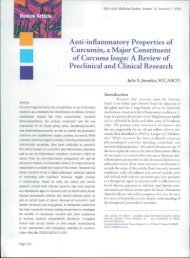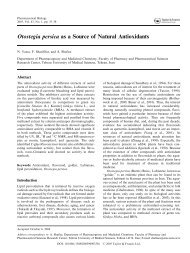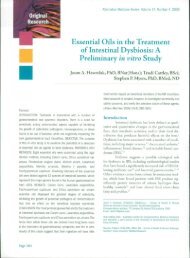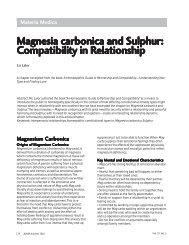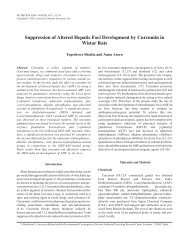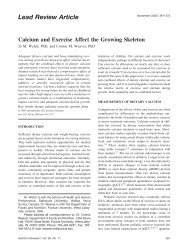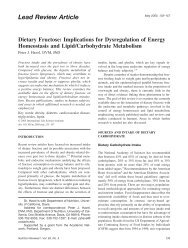Why Aging People Become DEPRESSED, FATIGUED, and ...
Why Aging People Become DEPRESSED, FATIGUED, and ...
Why Aging People Become DEPRESSED, FATIGUED, and ...
- No tags were found...
You also want an ePaper? Increase the reach of your titles
YUMPU automatically turns print PDFs into web optimized ePapers that Google loves.
WHY ACINC PEOPLE BECOME <strong>DEPRESSED</strong>, <strong>FATIGUED</strong>, AND OVERWEIGHT<br />
Cytokines<br />
(e.g. IFN)<br />
FIGURE 1. Metabolic Pathways of L-Tryptophan.<br />
The enzymes <strong>and</strong> cofactors involved in the reactions<br />
are listed next to the bold arrows, the dashed<br />
arrows, <strong>and</strong> the plus <strong>and</strong> minus signs indicate<br />
increases or decreases in the metabolites shown.<br />
Abbreviations:<br />
AADC: aromatic amino acid<br />
decarboxylase;<br />
B6: pyridoxine;<br />
BH4: L-erythro-tetrahydrobiopterin;<br />
5-HtAA: 5-hydroxyindoleacetic acid;<br />
5-HTP: 5-hydroxytryptophan;<br />
IDO: indoleamine 2,3-dioxygenase;<br />
IFN: interferon;<br />
TDO: tryptophan 2,3-dioxygenase;<br />
TPH: tryptophan hydroxylase.<br />
of a given meal's effect on brain tiyptopban-serotonin<br />
levels is tbe serum ratio of tryptophan to the pool of<br />
large neutral amino acids.'^^<br />
More clinically relevant, bowever, is tbat serotonin<br />
levels are enbanced by carbohydrate ingestion.^'' Tbe<br />
reason is tbat tbe bigb amount of insulin released in<br />
response to carbohydrate ingestion accelerates the<br />
serum removal of valinc, leucinc, <strong>and</strong> isoleucine that<br />
compete against ti^ptophan lor transport into the<br />
brain. Similarly, a higher percentage of protein in the<br />
diet slows serotonin elevation (by providing competing<br />
amino acids for the blood-brain barrier).'** "<br />
Giving tryptophan with an inhibitor of the TDO<br />
enzyme would enable lower doses of tryptophan to<br />
be used. In the rat, high doses of pyridoxine (vitamin<br />
B6) can inhibit tryptophan catabolism in the liver <strong>and</strong><br />
increase uptake of tryptophan into the brain.^'' While<br />
the effect of high doses of pyridoxine on plasma tryptophan<br />
has not been studied in humans, pyridoxine<br />
.should be given with tryptophan for another reason.<br />
When tiyptophan was given to normal subjects for a<br />
week, levels of tryptophan metabolites in the plasma<br />
increased indicating that tiyptophan was being broken<br />
down. This effect could be attenuated by pyi idoxine<br />
(pyridoxine assists the breakdown of the tryptophan<br />
metabolite kynurenine, which can compete with tryptophan<br />
for uptake into the brain), suggesting that<br />
chronic tryptophan treatment increases pyridoxine<br />
requirements.^'<br />
Clinical Implications: SLEEP DISORDERS<br />
Tiyplophan has been researched for sleep disorders<br />
for 30 years. Improvement of sleep normalcy has<br />
been noted^" at doses as low as 1,000 mg.'^ Increased<br />
stage 4 sleep has been noted at even lower doses—<br />
as low as 250 mg tiyptophan.'" Significant improvement<br />
in obstructive sleep apnea, but not central sleep<br />
apnea, has been noted at doses of 2,500 mg at bedtime,<br />
with those experiencing the most severe apnea demonstrating<br />
the best response.^'' While many sedative<br />
medications have opioid-Iike effects, L-tiyptophan<br />
administration does not limit cognitive performance<br />
or inhibit arousal from sleep.''"<br />
L-tryptophan depletion negatively impacts sleep. A<br />
significant decrease in serum tryptophan levels after a<br />
tryptophan-free amino acid drink was associated with<br />
an adverse effect upon sleep parameters (stage 1 <strong>and</strong><br />
stage 2 time, <strong>and</strong> rapid eye movement sleep time).'*<br />
L-tryptophan is not associated with tolerance or difficulty<br />
with morning wakening <strong>and</strong> has been shown<br />
to be efficacious for sleep in several clinical trials of<br />
various designs <strong>and</strong> L-tryptophan dosages.<br />
DEPRESSION<br />
As previously mentioned, L-tryptophan is essential<br />
for the brain to synthesize serotonin, a neurotransmitter<br />
that has been shown to affect mood. Several studies<br />
have shown that acute tryptophan depletion can cause<br />
a depressive state in humans, especially patients who<br />
48 I LIFE EXTENSION I COLLECTOR'S EDITION 2009





